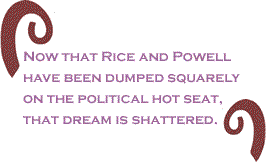
|
|||||||||||||||||||||
|
The following article previously appeared in The Hutchinson Report.. The raves were long and loud from conservatives and many blacks when President Bush appointed Colin Powell, Secretary of State, and Condoleezza Rice as his National Security Advisor. Their appointments to top foreign policy decision making positions stood in stark contrast to what some called the paternalistic practice of Clinton and other Democratic presidents to appoint blacks to showy cabinet posts that held little power or influence. Powell and Rice appeared to be the Bush administration’s go-to shot callers. They have become familiar faces and virtual household names eloquently and credibly promoting and explaining Bush administration policy decisions on North Korean nukes, Iran, the Middle East turmoil, the war on terrorism, and, of course, Iraq on the Sunday news talk shows. From all outward appearances, they didn’t just explain and promote Bush policies; they were also key players in making those policy decisions.
But when former Bush counter-terrorism expert Richard Clarke in testimony before the 9/11 Commission virtually dumped blame for the Bush administration’s September 11 intelligence failings on Rice, that was the first public hint that her vaunted decision-making role in the Bush administration may be much less than it seems. Now there’s the equally damning charge by the Washington Post’s Bob Woodward that Bush ignored Powell’s cautionary advice not to attack Iraq, and when he did attack didn’t tell him beforehand. Rice hotly disputed Woodward’s assertion that Powell was so out of the loop, and out of Bush’s trust, that he was ignorant of the attack. But her denials sounded like confirmation when she said only that Powell was at the war talk meetings, and was kept abreast of the plans, not that he had any real say-so over those plans.
The other reason they are there is race. Much was made at the GOP presidential convention in 2000 about Bush’s pledge to usher in a new racial era in the Republican Party. Supposedly that meant retooling the party from a clubby good ole white guy’s confab, and making diversity the watchword in the party. Powell and Rice were absolutely indispensable to Bush’s promised image remake. Before, during, and immediately after the presidential campaign, black leaders waged relentless political warfare against him for opposing reparations, and expanded hate crimes laws, and supporting school vouchers. They accused him of cheating blacks out of thousands of votes in Florida and hijacking the White House. They fumed at him for picking ultra-conservative John Ashcroft as attorney general. They railed that he would appoint more Supreme Court justices such as Clarence Thomas. They were petrified that he would torpedo civil rights and gut public education programs. Powell
and Rice could not quiet those fears, and many blacks questioned
their politics
and motives in being in an administration that they regarded
as inherently hostile to their interests. But many blacks privately,
and even publicly, expressed pride in their appointments, and
the roles they
Now that Rice and Powell have been dumped squarely on the political hot seat, and with massive doubts about their role as top gun Bush policy makers, that dream is shattered. If there is a second Bush term, the betting odds are that neither will be a part of it. If they were no more than alluring window dressing that put a good face and spin on Bush administration’s muddled and dangerous policies, it’s just as well. Earl Ofari Hutchinson is an author and political analyst. Visit his news and opinion website: www.thehutchinsonreport.com He is the author of The Crisis in Black and Black (Middle Passage Press). |
April
22 2004 |
|||||||||
|
|||||||||
|
|
|||||||||
| Printer Friendly Version | |||||||||
 |
|||||||||
| |
|||||||||
| |
|||||||||




























